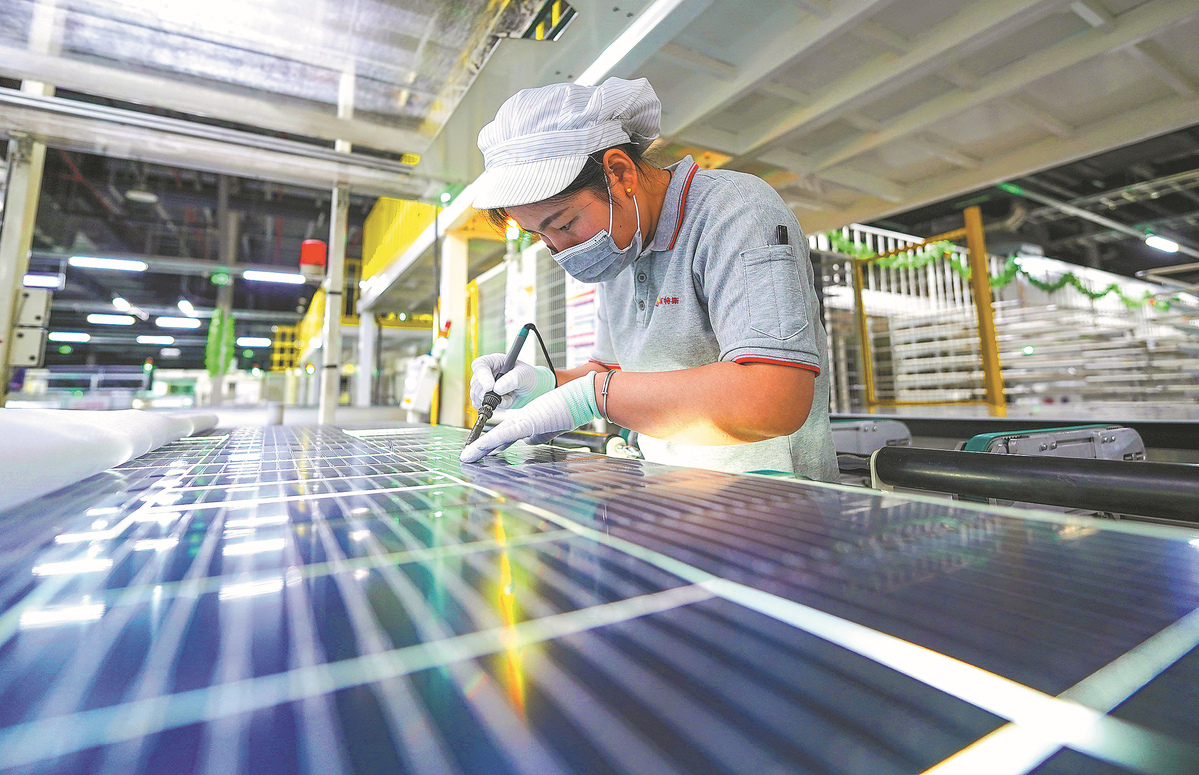
An employee works on a solar panel production line in Suqian, Jiangsu province. CHEN SHAOSHUAI/FOR CHINA DAILY
China's initiatives in advancing photovoltaic imports and exports, along with green technology transfers, have been instrumental in driving the transition toward a more environmentally friendly world, said a solar power company executive.
With persistent emphasis on technological innovation, China has fostered a robust and competitive solar power market, facilitating rapid growth of the new energy industry at home and abroad, said Li Xiande, chairman of JinkoSolar Holding Co Ltd, the world's largest solar panel producer by shipments.
The global new energy industry is currently experiencing a scarcity of high-quality production capacity, rather than "overcapacity", Li said in response to recent claims that China's new energy sector has overcapacity, causing global price distortions.
"The high-quality production capacity is never enough, while the low-quality production capacity is always in surplus," he said.
"With prices and sales of goods determined by global market forces in the era of economic globalization, the theory (of overcapacity) is unfounded with no substantial evidence."
Li added that China's success in green transition is partly due to continuous efforts in technological innovation. JinkoSolar, as a major photovoltaic firm in China as well as on the global stage, has also been stepping up investment in research and development to ensure a robust and competitive market environment for the rapid growth of the new energy sector.
JinkoSolar announced in March the launch of the first of its "Neo Green" modules to be produced with renewable energy. The N-type TOPCon Tiger Neo panels are produced at factories certified as "zero carbon", making it the first company in the industry with factories classified as such for ingot manufacturing, wafer cutting and cell and module manufacturing.
An analyst said China has been providing more choices to the global market and giving everyone equal opportunities to use green energy during the process of promoting the development of green energy worldwide.
"China's sufficient production capacity has helped other countries and regions around the world reduce their burden, in terms of production costs and technological development," said Ma Yinqiong, a senior analyst covering materials supply chains with global consultancy Rystad Energy.
While cost is the biggest bottleneck, especially for underdeveloped regions, China's raw material products have helped them reduce costs with faster green production capacity construction, she said.
The country's large-scale and standardized industrial technology has also helped developed countries and regions accelerate the process of greening, she added.
Li of JinkoSolar currently sees its cumulative shipments exceeding 250 gigawatts, with products sold in 190 countries. It has 12 production bases worldwide, three of which are overseas.
Operating on a global stage is crucial for JinkoSolar with its success hinging on globalization, as it allows for expanded market reach, diversified production bases and access to a broader talent pool, he said.
Globalization enables the scale and efficiency needed to lead in technology, innovation and distribution, allowing industry leaders to tap into various markets, meet international demand and foster sustainable growth, making it indispensable for their operations and success, he said.
In response to the growing share of renewable energy capacity and the deployment of electric vehicles, JinkoSolar believes energy storage will be a leading technology for energy transition investments over the next three years.
It has been significantly ramping up its efforts in energy storage modalities, investing heavily in the development and deployment of advanced energy storage solutions to complement its robust photovoltaic portfolio.
According to the 2023 Reuters Events Energy Transition Insights report, energy storage is going to be a leading technology for energy transition investments in the coming three years.
Energy storage will become a priority technology during the 2024-26 period. While batteries currently dominate growth in the sector, several other promising alternatives will be deployed commercially in the coming years, it said.
By integrating energy storage with its solar technologies, Jinko-Solar aims to optimize energy use and address the intermittency issues associated with solar power, making it a comprehensive provider of renewable energy solutions.
The company is exploring partnerships with leading technology firms and research institutions to drive innovation and efficiency in energy storage systems, including developing high-capacity batteries, improving storage efficiency and reducing costs, thus making energy storage more accessible and scalable.
Source: By Zheng Xin, chinadaily.com, 102May 16, 2024 [https://www.chinadaily.com.cn/a/202405/16/WS6645684fa31082fc043c767a.html]

